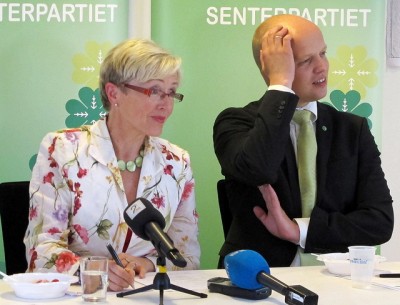New public opinion polls confirm a quiet political revolution in Norway that’s been building momentum for years: The small but potentially powerful parties that often can make or break governments have lost so much voter support that some of their most high-profile members can lose their ministerial posts or seats in Parliament. Voters are instead flocking either to the two main conservative parties on the right or merely to Labour on the left.

The latest polls, including one done for the newspaper Hamar Arbeiderblad of Hedmark County, shows that current Agriculture Minister Trygve Slagsvold Vedum of the Center Party, for example, would lose his seat in Parliament if an election were held today. That means not only have voters in the cities rejected his rural-oriented party, but so have voters in his own largely rural home district of Hedmark.
The Center Party (Senterpartiet, Sp) is also suffering in its traditionally strong counties of Møre og Romsdal, Sør-Trøndelag and Nord-Trøndelag. Current Transport Minister Marit Arnstad could also lose her race for a seat in Parliament as would MP Jenny Klinge. Even current Oil Minister Ola Borten Moe, a rural district advocate whose grandfather was a prime minister from the now shrunken Center Party, could lose his seat in Parliament. His party only won support from 4.5 percent of the voters in his home district of Sør-Trøndelag.
Voters clearly don’t back proposals recently rolled out by a Center Party desperate to win back support from farmers. In the past few weeks alone, Vedum and his colleagues have:
*** proposed killing all of Norway’s remaining wolves (claiming they stem from Finland and aren’t a native species worth protecting),
*** proposed building housing in recreational forest areas, to preserve farm land near cities,
*** promoted a bygdebevegelse (small town movement) that pits rural districts against urban ones,
*** proposed redirecting tolls paid by motorists for improved highways to help fund train service,
*** and, most controversially, supported even harsher import tariffs and higher food prices to further protect Norwegian farmers from foreign competition. The Center Party wants to preserve domestic food production at all costs.
This has not been popular among a majority of Norwegian consumers, while oil minister Moe also has faced internal strife for his dogged promotion of more oil production. Some Center Party faithful feel Moe’s bullishness on oil undermines the party’s environmental profile.
Even the humanitarian group Kirkens Nødhjelp (Norwegian Church Aid) is upset with the Center Party for its promotion of measures that would block imports of agricultural products from poor farmers in Africa. “What underdeveloped countries in the south beg for is access to markets in the north,” Anne-Marie Helland of Kirkens Nødhjelp told newspaper Aftenposten on Tuesday. Wealthy countries like Norway, Helland argues, must reform their protectionist policies and farm subsidies. Market access for the poor is “at least as important to them as foreign aid,” she said.
The expanding voter rejection of the Center Party spells trouble for the current left-center government coalition of which it’s a member. Both it and fellow coalition member SV (Sosialistisk Venstrepartiet) have fallen below the 4 percent level of voter support needed for representation in Parliament, leaving Labour potentially on its own with around 30 percent of the vote at present. Two other small parties (the Christian Democrats and the Liberals) are also teetering around 4 percent and have struck up an allegiance with the Conservatives and the Progress Party, which alone hold a majority at present.
It all means that Prime Minister Jens Stoltenberg faces the campaign of his life if he’s to win re-election to a third term next autumn. Right now, the non-socialist parties seem poised to glide into office and form an entirely new conservative government. Political commentator Arne Strand of newspaper Dagsavisen equated the new poll results to a “massacre” of the small parties that’s wiping out the centrist buffer zone between Labour and the Conservatives, at the will of the people.
Views and News from Norway/Nina Berglund
Please support our news service. Readers in Norway can use our donor account. Our international readers can click on our “Donate” button:

